Part1. How to find a reliable freight forwarder for shipping from China to South Africa?
Part2. How many modes of transportation are there from China to South Africa?
Part3. How to save money?

It’s sometimes hard to find a reputable business partner to do business among the thousands of companies currently on the market, and that’s what freight forwarders are for. Using a freight forwarder will make a big difference if you don’t have enough time and energy, expertise, or if you just want to escape all the difficulties that the international shipping process might offer you, such as paper preparation or cross-see transportation process problems. Freight forwarders will use their business experience to reduce costs and help you find solutions to any transport problems.
If you want to save time and money when making an international shipment from China to South Africa by air, sea or land, consider using a freight forwarder. A freight forwarder will ensure that your freight arrives on time and under the right conditions. If you are an occasional carrier who knows little about international shipping, we also suggest that you find a freight forwarder who will be able to assist you in this complex process. They have years of expertise and experience in this area, and you’re going to be able to save more time and money than if you ship by yourself.
If you are looking for a freight forwarder to handle your shipment from China to South Africa, whether you want air, sea or multimodal shipping, it is always better to choose a freight forwarder from China. The Chinese freight forwarder is the ideal choice for overseas transporters because there is the advantage of language and geography. You will also need a Chinese warehouse for storage and preparation in the shipping process. Choosing a local forwarder (from South Africa) will make you spend a lot of money and time because they will possibly need to contact another agent in China to manage pick-up, packing, processing, and customs clearance; and the language barrier will also be a problem.
Time, money and the success of your delivery from China to South Africa are the things that matter. Finding a reputable freight forwarder for your shipment can be a difficult task. Generally, there are a few questions that you can ask the freight forwarder or yourself to determine whether or not he is suitable for your transportation or not:

1. Does the freight forwarder have a business license from the Chinese Government? Having a business license makes things legal and straightforward for you.
2. Does the freight forwarder have an official website and a good Google ranking? You can find the necessary details about their products and costs on their website. Not to mention that, in these modern days, Google reviews are a must-have for any business that values itself and takes care of its customers.
3. Does the company have a good insurance plan in place? Having a good insurance plan is very important because it will pay for your product if there is any harm to your shipment or warehousing.
4. Do they have a full cargo tracking system to monitor the cargo progress in real-time? Having a freight shipping partner that provides cargo tracking is important because you can see in real-time where your shipment is and how much time it takes to get to the final destination.
5. You may also ask them to provide the latest shipment record or bill of lading. The bill of lading includes all relevant details of the nature, quantity, condition, and destination of the merchandise.
6. During the consultation were the responses prompt, with professional advice and explanations? If you are not very confident about their services, but still have some reservations about the process, it is best to try the freight forwarder with a shipment of a small number of goods. That way, if anything goes wrong, you are not going to lose a lot of money.
Before talking about modes of transportation from China to South Africa it is good to have an understanding of the import customs procedures in South Africa.
The import process in South Africa is a bit complex. The South African Revenue Service (SARS) has about 90 000 product codes that are exclusively applicable to all imports. Customs SA, a SARS division, dictates that importers should register and receive a SARS importer code. SARS uses the Single Administrative Document (SAD) to enable clearance at the customs for exporters, importers, and cross-border merchants. The SAD is a sort of a multi-purpose declaration of goods covering imports, exports, cross-border and transit movements. To obtain the SAD, the following documents are required:
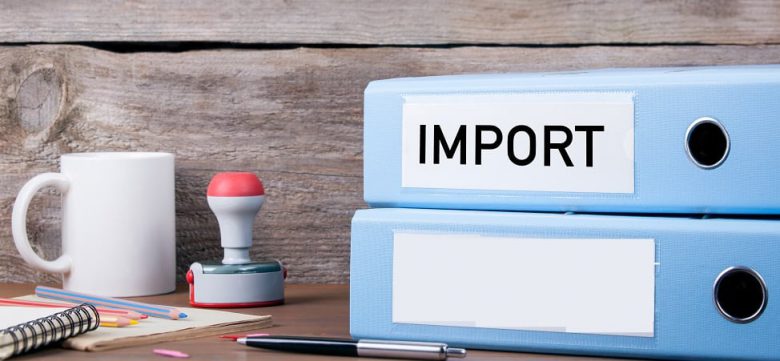
One negotiable and two non-negotiable print outs of the Bill of lading. The declaration of origin form known as DA59, which is to be used in cases where a rate of duty lower than the general rate is claimed, as well as for products subject to anti-dumping or countervailing duties.
Four copies and one print out of the original Commercial Invoice. Supplier invoices are not accepted as complying with the requirements of the customs regulations unless they comply with certain requirements of the SARS (see the SARS website for more information).
Copies of the Packing List (should be three copies). The data contained in this document and that in other documents should agree.
Kindly visit the SARS website for more details.
Certain restricted products need import licenses. License (permit) is only valid for the products of the stated class and region. It is non-transferable and may only be used by the individual to whom it has been given. Import permits are only valid for the calendar year in which they are issued.
Import permits needed for specific categories of restricted goods may be obtained from the Director of Import and Export Control of the Department of Trade and Industry. The ATA (Temporary Admission) Carnet system in South Africa applies to the entry of commercial samples, advertising materials and professional equipment. Goods should be properly labeled for identification purposes to enable their movement through customs. South Africa is a member of the ATA Convention (see ATA Carnet). Goods with an ATA Carnet are excluded from duty and VAT.
Express delivery is a relatively simple way of transporting goods. Research has shown that 95 percent of product samples and a small quantity of high-value goods are sent by courier. If you have an urgent and fast order, express delivery is the best option; in general, the delivery time for express delivery varies from one to three days, compared to two to eight days for standard shipping. It takes only one to four working days for shipments to be delivered to South Africa with FedEx, UPS, or DHL.
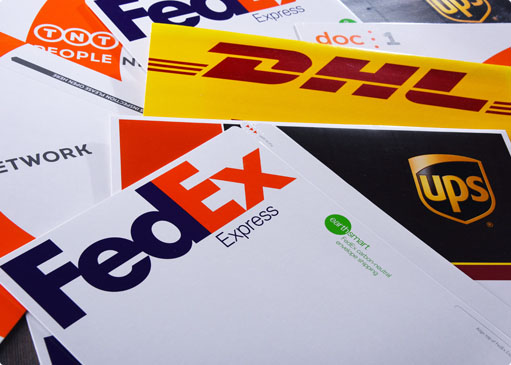
With this type of delivery, you do not have to worry about customs clearance or taxes, but because express shipping means quicker and faster delivery, costs and rates are higher than other forms of transport. Also, the cost of express shipping may rise during holidays, but it will drop dramatically during the off-season.
Freight forwarders can find an express service that offers a reasonable price, and they can also get a discount price that you can’t find on their official website. For express delivery, shipping less than 100 kg of freight from China to South Africa is cheaper and faster.
You always have to schedule your shipment in advance, particularly if you have a large load (over 500 kg) or if the package volume is more than two cubic meters. Generally, shipping by sea is the best choice for transporting large loads. However, it is also the most difficult mode of transport as it takes a long time. From China to South Africa, sea shipping time is calculated to be roughly 25 to 41 days from port to port and 42 to 47 days from door to door.
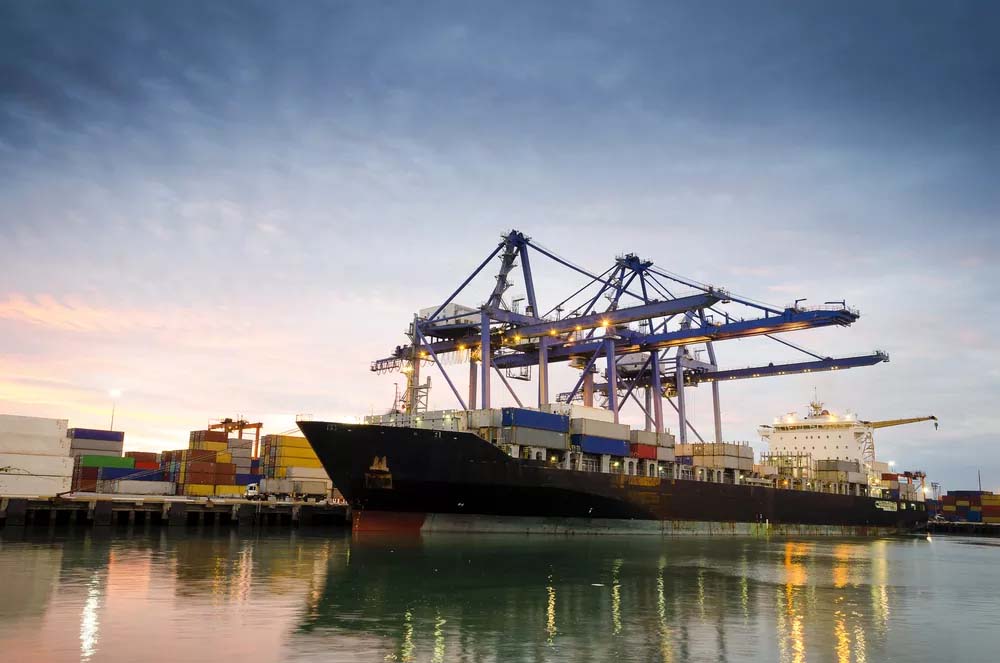
There are several ports in China, such as the port of Shanghai, the port of Ningbo, the port of Shenzhen, the port of Tianjin, the port of Qingdao, the port of Xiamen and the port of Hong Kong, from which your ship can depart to South Africa. If your freight forwarder is based in these cities, you will benefit more because the freight forwarder is already familiar with the rules for loading and unloading each port, making it easier to handle your goods, saving you time.
Sea freight transport is the best option for bulk freight transport, sometimes the only one. While importing from China, you can choose Full Container Load (FCL) or Less than Container Load (LCL) if your maximum cargo volume does not meet one full container requirement. When it comes to size, there are three types of containers 20 ft., 40 ft. and a 40 ft. high cube container. The 20 ft. containers are designed to carry more weight such as minerals, metals, machinery, sugar, paper, cement, etc., while the 40 ft. containers are designed to carry voluminous cargo rather than heavy cargo, for example, furniture, steel pipes, paper scrap, cotton, tobacco, etc.

If you do not have enough goods to fill a 20 ‘ or 40 ‘ container (FCL), you should use LCL. It allows importers to ship smaller amounts of cargo that do not have the necessary size to make Full Container Load a viable option. This means your cargo is combined with other shipping cargos for the same destination. When combining several shipments in one container, your freight forwarder needs to do more work. LCL freight is calculated in cubic meters (CBM) and charged based on the volume. Full Container Load refers to when the amount of your products is big enough to be loaded in at least one container. In this case, the freight is measured on the basis of FCL. FCL shipment will be packed and sealed at the source by your supplier and then delivered to your final destination.
While 90% of goods are transported by sea, when importers and exporters need to transport high-value items quickly and reliably to South Africa, such as seasonal goods, clothes, electronics and/or products that cannot be near water, they use air freight. If your load is around 100 kg, air freight will become a cheaper option. In a matter of days, air freight can take your cargo from the factory floor in China to your destination. Air transport reduces the shipping time between China and South Africa to 5 to 8 days for shipment from port to port and 6 to 13 days for delivery from door to door.
There are two ways to determine the cost of air freight. The first method is the price per kilogram multiplied by the weight of the freight, and for the second method, for low-density cargo (low-weight and high-volume) will be billed on the basis of the volume it occupies. There are two classes of air freight, economy, and express or fast air transport.
After you have defined your mode of transport for your goods, you are ready for the next step, which includes understanding the terms FOB, EXW, ICF, and DAP. Since transport costs are a key factor in the same transport model, knowing these concepts will help you save money.
Most websites use FOB, EXW, ICF, and DAP quotations. In general, such quotations provide information on where the cargo is being transported to and from, the mode of transport and the equipment used, specifics of the delivery, such as length, weight and description of the goods.
FOB means free on board or freight on board and is an international shipping agreement used in the transportation of goods between a buyer and a seller. FOB is the primary mode of Alibaba’s quotation, which means that your Chinese supplier will be responsible for the transportation from the Chinese factory to the Chinese loading and unloading port. For example, if you see FOB Ningbo – Ningbo is a city and a port in China, and it means that this is the port that the supplier will ship your order to, which is covered by the FOB price, and from here, you are responsible for the freight. The freight is divided into two aspects – the first one is from China airport/port to the South African airport/port, and the second one is from the South African airport/port to your doorstep.
EXW stands for Ex Works. If you see this quotation on the website you are buying from, it means that the seller is making the goods available at their premises, or another named place. In other words, EXW means that your freight has been increased one step, and you will be responsible for the transportation from the factory in China to the loading port in China. This is an aspect your Chinese freight forwarder will help you manage.
Your shipping costs will divide into three categories – From China factory to China airport/port – from China airport/port to South Africa airport/port – from South Africa airport/port to your doorstep. Over this, other transportation costs will be added such as Chinese export costs and customs clearance costs. Finding a reliable freight forwarder is important because he will let you know where every cost is going, with no hidden expenses.
CIF stands for cost, insurance, and freight, and it means that the supplier is responsible for all transportation costs from the factory in China to the airport/port in South Africa, including insurance.
In other words, CIF is an expense paid by the seller to cover the costs, insurance, and freight if a package or item is lost or damaged while it is in transit to an export port. The seller must cover other expenses such as additional customs, export paperwork, inspections or rerouting, but once the freight is loaded, you (the buyer) become responsible for all other costs, including the expenses from the South African airport or port to your doorstep. With CIF the supplier adds an extra charge to compensate for their efforts, and it becomes more expensive than FOB.
It will save you time and money if you find a freight forwarder, because usually, the suppliers in China will also find a freight forwarder to deal with the whole process, and they cannot professionally update the status of your goods promptly.
The last one is DAP, which stands for delivery at a place or destination delivery. If you see this quote on the website you are buying from, it means that the seller will handle all the charges and the delivery to the buyer facilities, but the import taxes will be paid by the buyer at the destination. Once the goods are ready for shipment, the packing is done by the seller at his own cost, then the goods are moved to customs location opted by the seller at exporting country at his expenses under DAP terms. All the necessary legal formalities in the exporting country are completed by the seller at his costs and risks; also the insurance up to the destination (South Africa) is arranged by the seller. If it’s not mentioned in the contract, the unloading cost at the final destination has to be borne by you (the buyer).
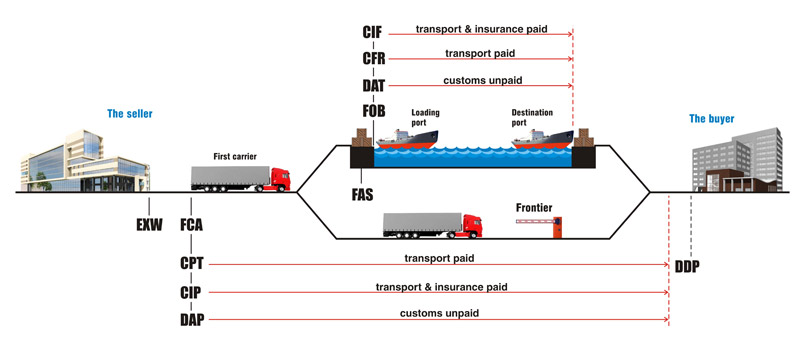
In other words, the seller is responsible for all the expenses and risks to deliver the goods up to the destination mentioned in the contract. From the destination mentioned in the contract, it becomes the buyer’s responsibility for the goods to reach his premises at his own expense. But even if the seller is responsible for all the shipping steps, he can’t do detail work such as warehousing, labels, and goods inspection, so it is best to find a reliable freight forwarder, to help you with the detail work.
Therefore, the best way to save money and time is by choosing FOB or EXW, because your goods will be in professional hands, with the lowest price, and the fastest time to reach your destination.
While South Africa has signed the GATT and liberalized import controls with the intention of gradually eliminating them entirely, certain categories of imports are still subject to licensing and control regulations. Most goods are duty-free when entering South Africa. Goods subject to duty pay an average rate of 12%. There are six tariff levels: 0 percent, 5 percent, 10 percent, 15 percent, 20 percent, and 30 percent.
The South African Development Community wanted to open up a free trade area between the Member States by the year 2000. Common customs, excise duty and a14 percent value-added taxes (VAT) are levied. Excise duties of around 10% are imposed on alcohol, cigarettes, petroleum products and motor vehicles. Ad valorem excise duty is imposed on office equipment, film, and luxury consumables. For a number of products, export licenses are required.
Generally, paying special attention to the charges is going to save you money. If you want to transport goods via express delivery and air freight you should take these rules into account because the costs can be high – the weight is calculated in kilograms (kg), and the volume is calculated in cubic meters (CBM).
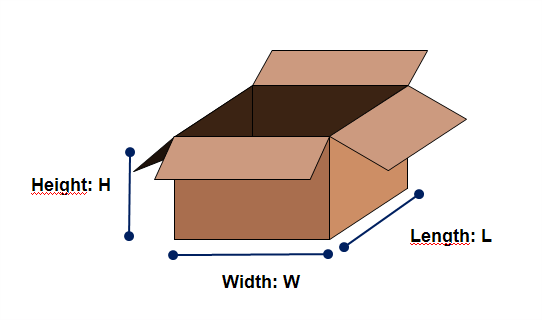
A) Calculating the actual weight – If the actual weight of the goods in kilograms is more significant than its dimensional weight, it will be calculated like this:
Actual weight of the package x cost per kilogram (this price varies from company to company).
B) When the volume of the goods is larger than the actual weight is called dimensional weight – this is an estimated weight calculated by multiplying the length of the package with the width and height divided by a dimensional factor, also called a DIM divisor. Dimensional factors are numbers set by the major freight carriers, and represent cubic inches per pound. The dimensional weight is the weight of the package at the minimum density accepted by the carrier.
Dimensional weight = length × width × height/dimensional factor
International transport and logistics companies are based on the maximum value they can charge. For example, freight carriers like USPS, FedEx, or UPS calculate shipping charges based on whichever number is greater (actual weight or dimensional weight) – if you have a package that has the actual weight less than 31 kilograms (let’s say 29 kg), the freight carrier will charge for the dimensional weight of 31 kilograms since it is the greater number. For them, whichever number is higher becomes your billable weight. Therefore, in some cases, to save money it is necessary to compress the package to reduce the measurement volume.
Finding an experienced freight forwarder will give you the most cost-effective solution promptly, and will save you money and time.
When it comes to international shipping, you always have to schedule your shipment in advance, because the delivery time of your goods is the main factor that determines the mode of transport. Understanding the schedule of holidays in China and the essential shipping deadlines and instructions will also save you time and money because in those peak periods, shipping rates are usually higher and factories are closed.
Here are some examples of peak seasons for shipping from China to South Africa: –
If your shipment is not urgent, you will save money and you will also have time to face unplanned delays such as congestion, blockages, problems with the supplier and errors in the documentation. You can also ask questions about the company’s response to delays to see if they have procedures to resolve these issues.
When air freight is too costly and the cargo cannot be transported by sea due to a long time for sea delivery, you can negotiate with the freight forwarder, who can provide the possibility of multimodal transport combining air freight and sea freight with other modes of ground transport (trucks, trains or some other means of transport) for delivery.

Multimodal transport, also known as combined transport, is the transport of goods with at least two separate modes of transport under a single contract. Legally speaking, the carrier is responsible for all transport and does not have to own all means of transport. This mode of transport may result in certain transshipment and handling costs, but it also has many benefits, such as centralization of responsibility in one transport operator, economies of scale in transport negotiations, the use of international experience in transport, in the field of bureaucracy and commerce, better use of available infrastructure and more efficient means of transport, focused on cost reduction, and reduction of indirect costs (e.g. human resources).
Finding the right freight forwarders is a must again because they can also work through their connections to your benefit to find a way to achieve this goal faster and cheaper. This hybrid approach should deliver the goods in the right timeframe and keep the delivery on budget.
Irrespective of the mode of transport you have selected from China to South Africa, this process is always complicated and requires a number of steps, such as warehousing, documentation, customs issues, freight insurance and so on. The international logistics industry has also grown as a result of the rapid development of international trade; the choice of an experienced and reliable freight forwarder is the key to solving the problem of international transport.
China Freight is customer-driven, puts customers first and offers them the best possible shipment from China to South Africa through our freight forwarders experts. We have the experience, airline relationships, customs reputation, competitive prices, and timely delivery. Our success is based on transparency and accountability.
As a market leader in the clearing and forwarding industry, our mission is to sustain a reputation for excellence by offering outstanding logistics services in a professional and sustainable manner, supporting and expanding regional and international trade.
Our experts are ready to start your worry-free shipping journey, click here for more information and quotes.
